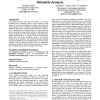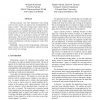61 search results - page 4 / 13 » Forensic engineering techniques for VLSI CAD tools |
ISCAS
1999
IEEE
14 years 6 days ago
1999
IEEE
High-level power design presents a complex, multiobjective problem that involves the simultaneous optimisation of competing criteria such as speed, area and power. It is difficult...
GLVLSI
2005
IEEE
14 years 1 months ago
2005
IEEE
A hierarchical scheme with cells and modules is crucial for managing design complexity during a large integrated circuit design. We present a methodology for thermal aware cell-ba...
DFT
1999
IEEE
14 years 6 days ago
1999
IEEE
The inherent redundancy and in-the-field reconfiguration capabilities of field programmable gate arrays (FPGAs) provide alternatives to integrated circuit redundancy-based fault r...
HICSS
2008
IEEE
14 years 2 months ago
2008
IEEE
The wealth of data available about a person’s computer activity is immense. Digital forensic sciences have progressed such that tools are readily available to recover deleted da...
ISSRE
2006
IEEE
14 years 1 months ago
2006
IEEE
Moving program code that implements cross-cutting concerns into aspects can improve the maintainability of legacy systems. This kind of refactoring, called aspectualization, can a...


